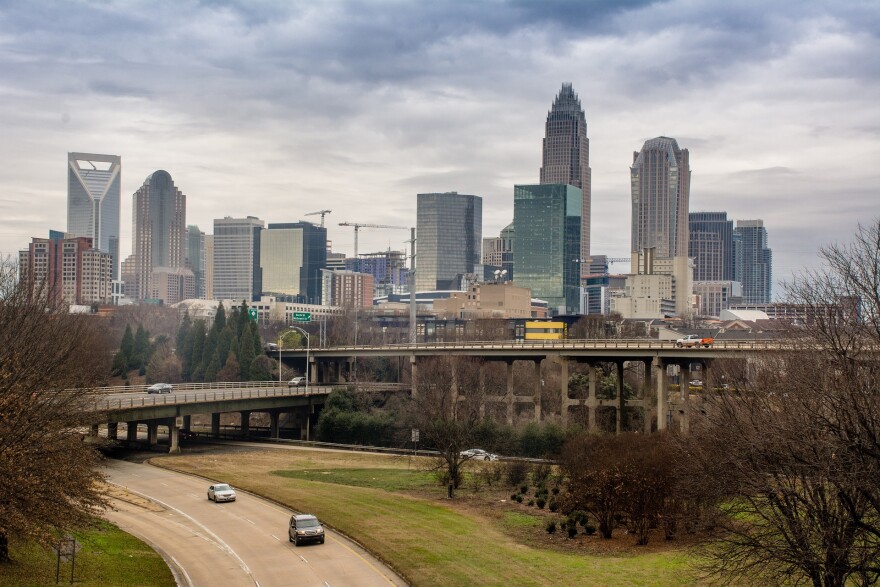The city of Charlotte has adopted a policy known as “Vision Zero,” whose goal is to have no traffic fatalities or serious injuries by 2030.
But as the City Council is implementing policies to get people to drive slower, the Charlotte Mecklenburg Police Department has dramatically de-emphasized speeding enforcement.
Ten years ago, Charlotte Mecklenburg police wrote nearly 32,000 speeding tickets. That’s one ticket for every 22 people who live in the city. This year, the department is on pace to write about 13,200 tickets — one ticket for every 68 Charlotteans.
Coerte Voorhees, the deputy chief of patrol services for CMPD, said several factors are driving the decrease.
Part of the decline is due to staffing shortages, as the department struggles to fill vacancies. But another reason is that a series of police chiefs, including Rodney Monroe and current chief Kerr Putney, have decided there are better ways to deploy officers.
“I could write tickets all day on Pavilion Boulevard [in northeast Charlotte] where it’s 35 miles an hour, but there is very little traffic there and there would be no impact in it. So what’s the purpose?” Voorhees said. “We would be better served being in a neighborhood where there's a burglary problem or hotpot in the evening, where there might be robberies or larcenies.”
Last year, a record 27 pedestrians were killed on Charlotte’s streets. With a month remaining in this year, Charlotte is on pace to break that grim record.
The U.S. Department of Transportation has cited studies showing that 5 percent of pedestrians would die when struck by a vehicle traveling 20 miles per hour. That rises to a 40 percent death rate at 30 miles per hour, and 80 percent for a collision with a car or truck traveling 40 miles per hour.
Last week, council members approved a new policy to make it easier for neighborhoods to get four-way stop signs and speed bumps. They have also debated whether the city should bring back red-light cameras.
But as council members and city staff have focused on Vision Zero, many aren’t aware that CMPD doesn’t prioritize speeding enforcement as it did a decade ago.
“So obviously they are an important part in our Vision Zero conversation and they definitely have a seat at the table," Director of the Charlotte Department of Transportation Liz Babson said. "They are one of our stakeholders because enforcement is important piece in really moving toward zero deaths and serious injuries on our city streets."
Babson is directing much of the city’s Vision Zero plans.
“But the numbers you just quoted to me, I have not heard before," Babson said. "I don’t know that there has been a specific shift in their philosophy.”
It’s not just speeding that’s no longer a priority for Charlotte police.
The total number of traffic stops has also plummeted over the last decade. There were 152,500 traffic stops in 2010 and the department is on pace for about 84,000 this year. Those stops are made for things like running stop signs or people with problems, like a broken turn signal.
Part of that is a philosophy to use officers against more serious crimes. Putney, the current chief, has also spoken about a desire to write fewer tickets and give more verbal warnings. For low-income residents, not having the money to pay a ticket can snowball into more problems — like having to take off work to attend court.
Some council members have applauded this shift towards more warnings. For speeding, the city gave 4,878 verbal warnings ten years ago. It's on pace to give about 7,600 verbal warnings for speeding this year.
But there is another reason why officers may be making fewer stops: Paperwork.
Vorhees said officers must now fill out paperwork on each encounter with the public, such as the race and gender of the person they interact with. They also must file paperwork with the body-worn cameras they wear.
"When we started doing data collection, you would record the demographics and the reason for the stop," he said. "And we had DMVRs at that time, which were the in-car cameras. When we went to body-worn cameras, you have to categorize your video after every interaction with somebody."
But as the city works to reduce fatalities and serious injuries, Shannon Binns of Sustain Charlotte said speeding enforcement is critical.
"Those numbers you shared are very telling and very startling," he said. "And certainly, I would argue that it’s safe to say that it’s contributing to the problem. There are lots of things at play. The speed at which vehicles travel is a big determinant as to whether people are hit, but also the chances of a pedestrian surviving are greatly affected by the speeds."



